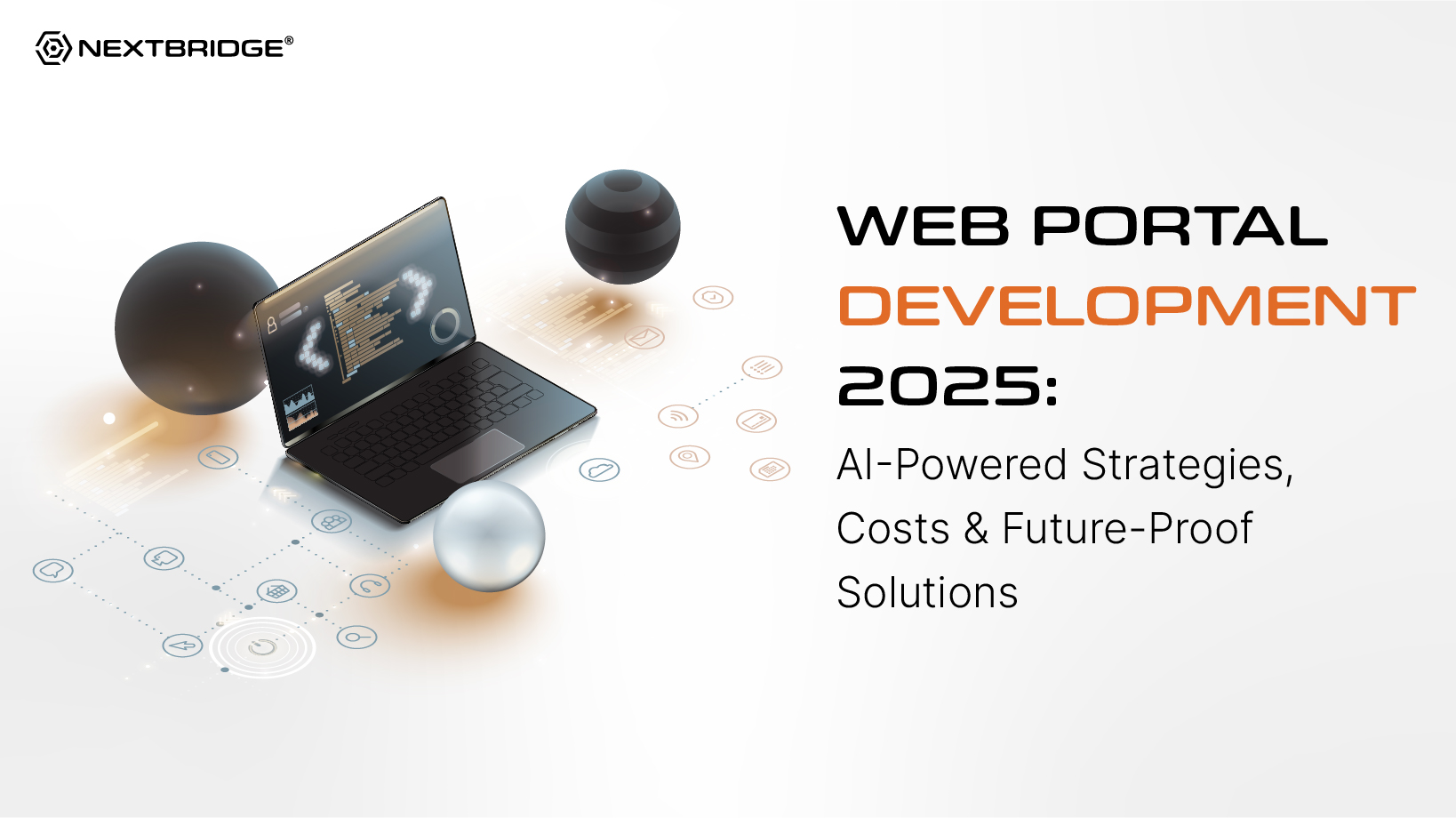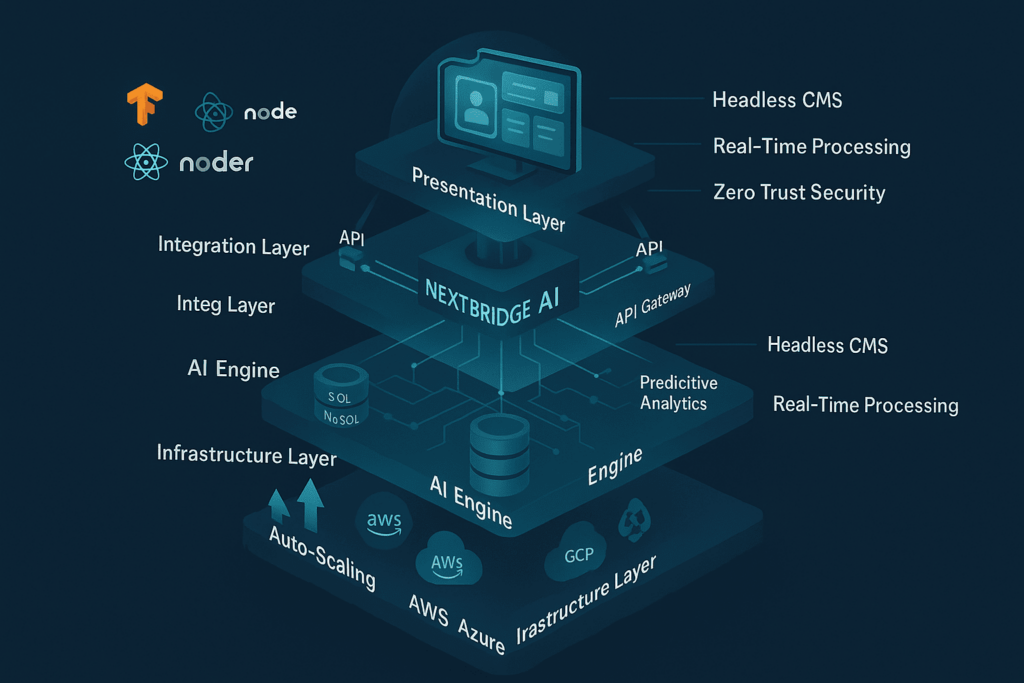 Back to all articles
Back to all articles
Blogs
Web Portal Development 2025: AI-Powered Strategies, Costs & Future-Proof Solutions


Do you ever consider web portal development for your company? A web portal is a crucial element of your company because it gives outsiders access to your company. So building an appropriate web portal can be a very responsible job.
But here comes the AI, the future of development has never been brighter. With its advanced technologies, you can integrate new elements into the website and make it more attractive for users.
Let's take a thorough look at this blog's good strategies, costs, and solutions for a web development portal.
Key Strategies for a Web Development Portal
Plan Your Web App Project
Thoughtful planning is very important when it comes to building an AI-powered web development portal. Firstly, you have to clearly define the scope of the project, mark which elements of the project can be enhanced with AI, and also keep in mind the customer’s needs and requirements.
To simplify the goals, make a road map with a realistic timeline, fewer errors, and do early alignment of your development goals, technical requirements, and customer needs. An AI-focused project should cater to all the challenges, like model training, data collection, and its integration with already existing systems.
Choosing an Appropriate Tech Stack
Selecting the appropriate technologies and AI tools can directly impact your web portal development success. Choose those that align with your project goals, beyond frameworks, programming languages, libraries, and servers. Need an expert in HTML and CSS for advanced structuring and styling of webpages.
Also, explore modern approaches for building a web portal like Jamstack, composable architecture, and headless. But make sure your team is experienced enough in the main technologies and modern AI tools to deliver a good-quality project.
Designing of User Interface
To build an attractive user interface, it is important to use AI tools; these tools can change the overall appearance. Include smart structural elements like AI chatbots, search tools, and customized block content options to improve usability.
All the hyperlinks should be visible and clickable, place the logo in the top-left corner, and contact information in the top-right corner. And the most important thing, content on the website should be updated on a regular basis, keep the content fresh, useful, and engaging for the users.
Focusing on User Experience
You can provide a hyper-personalized experience but using AI to enhance user experience. Utilize AI to monitor user needs, their behavior, and the adaptation of the interface. To boost engagement and satisfaction, use features like customized recommendations, predictive search, and automated support.
To make the user experience better and resolve the user pain points faster, take the help of AI-powered analytics, do A/B experiments, and continuous testing. Keep your focus on
Crafting a very accessible, responsive
Web Portal Development Process
Here are the basic steps of the process in every web development project
Planning the Portal Type
In this phase, you need to define the portal’s purpose and its target audience. You need to clearly define either its internal portal, customer portal, vertical-specific portal, or partner portal.
Identification of the type can help you set the goals and help the team understand the development process and designs.
Collection of Data
In this step, you have to collect all the details about the functionality, technical stacks, and tools required for the project. Make a thorough map of things, what will be the sequence of development, user needs, clients' demands, and availability of resources, etc.
Make a formal document that holds all the things and share it with the team so everyone has the same understanding about the project. Also, your requirements should include security protocol, access role, data sources, integration points, and compliance.
Portal Design
Here comes the designer team, who make interactive prototypes and wireframes. The main goal of this is to see visual harmony, user experience, and information about architecture. Prototyping can significantly help you in getting honest feedback from users and usability of the project before the development process.
Development Process
Once you are satisfied with the designs and get the required feedback, the development team will start coding. The front-end and back-end developers will work collaboratively throughout the process.
Testing
Your QA team will work closely with the development team, and the testing will cover all the major aspects like device compatibility, security, functionality, performance, and accessibility.
Any bugs, issues, or defects that are found during the testing phase will be fixed until the project meets the quality standards.
Deployment Phase
In this step, the deployment will move the web portal to the live environment. It might include the setting of migrating databases, cloud hosting, transferring of initial consent, and orchestrating containers. To set the accuracy of real-world conditions, you need to do live testing.
Factors Affecting Web Portal Development Cost
The cost of web portal development depends on different elements, which include custom features and the location of the development team. If you understand these factors, it will help you in setting a practical budget.
Features and Complexity
One of the major role in determining the cost of a web portal is complexity. A simple web portal development with main features will definitely cost less compared to a portal that has innovative features like automation, AI, and analytics. Advanced features need more resources, team, and tools, and also a huge chunk of the budget.
| Development Type | Estimated Cost Range |
| Basic Portal | $10,000 – $30,000 |
| Mid-Level Portal | $30,000 – $100,000 |
| Enterprise-Grade Portal | $100,000+ |
Customization
A highly customized web portal leads to a higher cost of the project. If you need to get full control of project’s features, functionality, and its branding, select a customized web portal development.
But this is also very costly, so try to utilize the pre-built templates, because they are very budget-friendly and also offer limited flexibility. For a fully custom web development portal, you need a larger development team, time, and testing, which ultimately leads to higher costs.
Tech stack
One of the important thing that significantly impact your web portal development’s pricing is the selection of the technology stack. To cut the cost, you can use open source platforms, but for innovative features and custom software like blockchain security and AI chatbots, demand some additional investment.
Development team and location
No one thought that hiring a development team could make a huge impact on the web development portal’s cost. Developers located in Western Europe and North America can be very costly, but if you outsource from East or Asian countries, it can be very fruitful, cost-efficient, and with no compromise on quality.
Always hire through a company because they give quality services with contracts compared to freelancers. They lack support and reliability.
Web Portal Development Pricing Models
| Pricing Model | Best For | Cost Structure |
| Fixed Cost Model | Well-defined projects with clear requirements | One-time payment, ranging from $10,000 to $50,000 |
| Hourly Rate Model | Evolving projects requiring continuous updates | Rates vary from $30/hr (outsourcing) to $150/hr (premium agencies). |
| Subscription-Based Model | SaaS-based portals with ongoing support | Prices start at $50/month to $1,000/month for enterprise features. |
Hidden Costs are More Costly
Many companies make that mistake about taking hidden costs for granted, but it can cost you a lot, like
- API licensing fee
- Ongoing cybersecurity measures and support
- Server upgrades, hosting, and cloud storage
Optimizing Web Portal Development Budget
If you want to optimize the web development portal budget, follow these strategies
- Instead of adding extra features, focus more on important and essential features.
- For a streamlined development process, work collaboratively with a highly experienced web portal development company.
- Go for a more scalable solution that helps in future expansions.
Future-Proof Solutions for Web Development Portals
Here are the key pillars
Design & Testing
To make a future-proof web development portal, you need to understand what a user wants. Do user research to clarify things, make workflows, reduce assumptions, and make sure the design is parallel to users’ expectations.
Constant testing from the initial phase to launch can significantly help you in filling the gaps and making adjustments.
Architecture & Performance
Without dropping the performance, modern portals have to manage the excess user load and expanding data. For flexible updates without breaking or damaging the system by adopting scalable frameworks, micro-frontend architecture, and modular codebases.

To further improve the responsiveness, use tools like CDN integration, asynchronous data handling, and caching.
Built-in Security & Privacy
To future-proof anything, you need to resolve little issues before they become a big mess. Enhance the security by API protection, input validation, secure authentication, and encryption, which control the weak points before things get out of hand.
Utilize privacy by design rule for data privacy, which should be embedded into the system. Keep your portals secure, safe, and compliant with regular audits, automated vulnerabilities, and penetration testing.
Conclusion
Web portal development in 2025 is not just a platform; it's about creating a digital space and a better user experience. Using AI can actually enhance the overall platform by using the appropriate technologies, strategies, planning, and user-centric approach.
Some factors can also help you cut down costs by using a development team from different regions. Also, using future-proof solutions can help you to keep your portal relatable to the future, so the platform never gets old to users.
Don't hire us right away
talk to our experts first,
Share your challenges, & then decide if we're the right fit for you! Talk to Us
Partnerships & Recognition
Commitment to excellence






